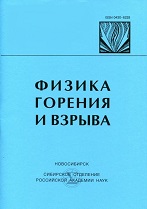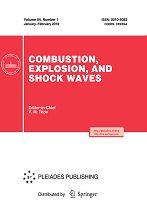|
This article is cited in 4 scientific papers (total in 4 papers)
Numerical study of the effect of burnout on the ignition characteristics of polymer under local heating
D. O. Glushkov, G. V. Kuznetsov, P. A. Strizhack
Tomsk Polytechnic University, Tomsk, 634050, Russia
Abstract:
This paper presents a numerical study of the effect of burnout on the ignition delay of a typical thermoplastic polymer (polymethylmethacrylate) by a metal particle heated to a high temperature. The initial temperature of the power source was varied from 960–1150 K. Three ignition modes of the polymer are distinguished according to the temperature of the heat source, ignition delay, and the position of the ignition zone in the vicinity of the hot particle. It is found that under local heating conditions, the burnout of the heated area of the surface layer affects insignificantly (by less than 5%) the increase in the basic characteristics of the process – the ignition delay. At the time of initiation of the combustion, the degree of thermal degradation of the polymer (degree of conversion) does not reach even 15% in the section corresponding to the maximum heat flux from the heat source. It is shown that the ignition delay increases more significantly when accounting for the temperature dependence of the thermal properties of polymethylmethacrylate than when accounting for the burnout factor. The induction period is increased by 15–25% due to an increase in the polymer storage capacity and heat transfer rate from the heated the area of the surface layer deeper into the material.
Keywords:
combustible polymer, heated particle, burnout, ignition.
Received: 04.07.2016
Revised: 11.10.2016
Citation:
D. O. Glushkov, G. V. Kuznetsov, P. A. Strizhack, “Numerical study of the effect of burnout on the ignition characteristics of polymer under local heating”, Fizika Goreniya i Vzryva, 53:2 (2017), 59–70; Combustion, Explosion and Shock Waves, 53:2 (2017), 176–186
Linking options:
https://www.mathnet.ru/eng/fgv396 https://www.mathnet.ru/eng/fgv/v53/i2/p59
|


| Statistics & downloads: |
| Abstract page: | 38 | | Full-text PDF : | 7 |
|





 Contact us:
Contact us: Terms of Use
Terms of Use
 Registration to the website
Registration to the website Logotypes
Logotypes








 Citation in format
Citation in format 
